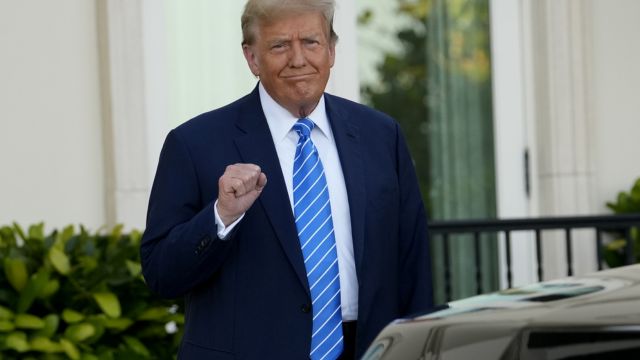A judge in a New York appeals court has rejected a request to postpone the trial in the hush money case involving former President Donald Trump. The Appellate Division First Department will review Trump’s appeal to ease the limited gag order at a later date.
The full panel will now review and discuss three factors that have the potential to impact Trump’s upcoming criminal trial in the following weeks.
On Monday, the trial is set to begin, and the appellate court may make a decision on whether to delay the trial. This decision will come as a result of considering Trump’s appeal of the gag order and a separate ruling that has kept the case in Manhattan.
The parties are required to submit written arguments regarding the change of venue by April 22. Additionally, written arguments regarding the gag order must be submitted by April 29.
Trump’s defense lawyer, Emil Bove, claimed on Tuesday morning that the gag order is causing “irreparable harm” to the former president. Bove argued that the order prevents Trump from effectively responding to attacks made by former Trump attorney Michael Cohen and adult film actress Stormy Daniels, who are both expected to be trial witnesses. Furthermore, the gag order restricts Trump from criticizing one of the prosecutors involved in the case and expressing support for a recent motion to recuse the judge due to the conduct of the judge’s daughter.
Judge Cynthia Kern expressed skepticism in response to Trump’s request for a stay of the entire proceeding. She questioned the distinction between the gag order and a similar order that was upheld in Trump’s federal election interference case.
According to Bove, Cohen and Daniels have taken a unique approach in publicly criticizing President Trump, distinguishing themselves from other witnesses involved in similar cases.
Steven Wu, a lawyer representing the Manhattan District Attorney, opposed the request for a stay by highlighting Trump’s well-documented track record of making disparaging remarks. Wu pointed out that Trump has consistently referred to witnesses as “losers,” “horse face,” and “deranged psychopaths.”
According to Wu, it is crucial that the criminal trial continues without any hindrance. Wu emphasized the significance of preventing the defendant’s extrajudicial statements from influencing the trial proceedings.
Wu is concerned about the potential impact of Trump’s remarks, as they may put others in the “line of fire” and could potentially affect the willingness of trial witnesses to participate.
According to Wu, finding witnesses in our case to come forward and testify has already proven to be challenging.
Trump’s legal team has expressed frustration over the gag order, arguing that it limits the ability of the presumptive Republican nominee to address important issues in both his political campaign and his legal defense.
The challenge involves an administrative petition filed against Judge Juan Merchan, who has prohibited Trump from verbally attacking witnesses, prosecutors, and court staff.
Merchan recently extended the gag order to encompass his family members, as Trump persistently targeted the judge’s daughter due to her involvement with a Democratic political consulting firm.
In a previous civil fraud case, Trump faced a limited gag order and challenged it using the same method. Initially, he was successful in obtaining a temporary stay, but ultimately, the full appeals court upheld the gag order.
In April of last year, Trump entered a plea of not guilty to a 34-count indictment. The charges stemmed from allegations of falsifying business records related to a hush money payment made by Cohen to Daniels shortly before the 2016 presidential election.
Jury selection for the trial is set to begin on April 15 in New York City.



